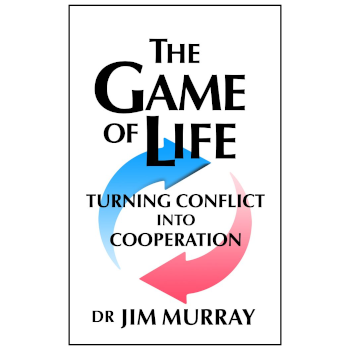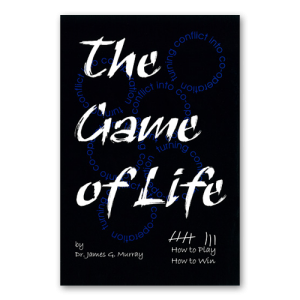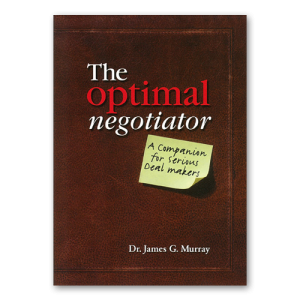Description
SOME EXCERPTS …
Introduction:
Like it or not, whatever we do in life, we require the cooperation of others. Whenever we seek to achieve our goals, realize our dreams, exchange ideas, change attitudes, influence decisions, reach agreement or enhance the quality of our relationships, we invariably must turn situations of potentially damaging conflict into opportunities for cooperation. Knowing how to find creative solutions when others oppose our views makes life a lot simpler, much less stressful and infinitely more rewarding.
The game of life has been going on since the beginning of time. It will continue to be played out by humankind as we endeavour to satisfy our interests and resolve our differences. The game, as I see it, consists of finite principles and infinite variables. It’s a game of power, creativity and communication. It demands a delicate mixture of psychology and philosophy, of art and science, of style and substance. It prizes intuition as highly as intellect, common sense as much as certain inviolate norms. Some play the game masterfully while others only dimly understand it.
The Game:
Life is not a game. On analysis, this intriguing analogy doesn’t hold up. Games are, by definition, competitive. Life often is but need not be. Cooperation, collaboration and mutual profit improvement are preferable to making everything a contest of wills or a disagreement about beliefs. In games, we compete to win. Hence, I can only win at your expense. Yet, in life, it’s possible for both of us to win. And, once we know how, we can do so graciously, bravely and consistently.
Games have rules. Life doesn’t. We are governed by laws duly legislated by the state to ensure peace, order and good government. And there do exist generally accepted norms and codes of conduct that ensure the maintenance of what most deem decent, respectable or civilized behaviour. Yet there is no mutually endorsed or embraced set of “rules” that govern interpersonal relationships.
Apart from rules, games tend to encompass a finite number of variables. But life is infinite in its variability. Incessant change, unforseen circumstances, volatility and disruption, personal growth and “infoglut,” ensure its complexity and unpredictability. If life is not a game, why should we call it one? Because it is instructive. It provides us with much needed perspective and emotional distance from demanding people, tough choices and difficult encounters. Games aren’t real but they are fun to play.
And when we play them, we invariably focus our attention on what it takes to win. And that is also the objective in the game called life.
The Obstacles:
Winning demands self-awareness. We need to know what constitutes our hot buttons. They, in sum, comprise our Achilles’ heel – that which makes us vulnerable to the tactics of others. They arouse the emotional (not the thinking) brain. Knowing how to pause or reset them enables us to play the game with greater self-control, style and grace. Hot buttons trigger stress, anger, frustration, confusion, jealousy, guilt, anxiety, depression, fear or other unhelpful responses. They are, of course, our natural defenses against insincere criticism, annoyances and accusations designed to take advantage of us. But they are often disproportionate to the assault that causes them.
What distinguishes humans from other creatures is that we can make conscientious choices. We can decide to take the attack personally and react emotionally. When this happens we either go on offense or become defensive. In the game of life however, being defensive is tantamount to losing. Alternatively, we can consider a assault on our character more rationally and respond in a more considered, strategic way. This is the choice that enables better tactical responses.
The Rules:
Every game has rules. Our understanding of them and our skill at executing appropriate responses in accordance with the rules determines whether we win or lose. The more we practice them, the greater will be our chances of success. We may agree that certain norms should constitute the foundation of civilized behaviour, but there are no universally accepted rules that govern how we are supposed to conduct our interpersonal affairs. A broadly accepted code of oughts depends entirely on one’s values and beliefs. For the purpose of winning, I suggest the following eight as the essential ground rules (the book explains these in separate chapters).
The Players:
It’s time to meet the players – the ones who cause most of our grief, lost harmony and productivity. The ones who are most likely to frustrate, demoralize and rob us of our capacity to deal effectively with them in pursuit of our objectives. The ones who know how to keep us off balance and who likely cause most of our stress and anxiety. They are the intentionally difficult and they know it.
In the following chapters, we’ll examine fourteen of these troublesome players and provide guidelines for developing a smart game plan for each. What makes these players noteworthy is their immunity to our normal methods of communication and persuasion. Having learned early in life they can disarm,
incapacitate or even punish others, they are able to recognize and negate the methods reasonable people typically use (but fail) to “get through” to them. Rather than help the situation at hand or advance a mutual cause, our well-intentioned efforts to influence them usually makes the situation worse.
Playing the game is a continuous process of learning the game. Done well, it demands an understanding of the why and how of intelligent and artful phrasing, of employing appropriate non-verbal gestures and
of communicating in a non-defensive manner. Without attention to these skills, our efforts usually result in resistance, resentment or revenge.
As you get to know the gambits each player, you’ll develop the necessary emotional distance to make appropriate tactical judgements while living or working effectively with them. With that mental separation will come a deeper understanding of the causes of the behaviour, why it effects you as it does, and how to turn their needs into the fuel that drives more harmonious relationships.
Some of these players will be familiar to you. Maybe it’s an uncooperative or overly agreeable subordinate, a pompous know-it-all associate, a vacillating boss or unresponsive teenager. You’ll learn why reasoning and pleading with them hasn’t worked in the past. You’ll discover how to become a more powerful and sensitive communicator under pressure. And you’ll find out how to enrich these important relationships. You may be asking are these things really possible? In a word, yes. Provided you’re willing to see these challenging players as great teachers.





ryan –
Some books are a pleasure to read but provide little practical value. Dr. Murray provides easy-to-understand rules and tactics for dealing with difficult people. I bought this book after attending a seminar with Jim, years ago. And now I have the updated edition. As a voracious reader, I judge books on two criteria: 1. Would I read it again? And, if yes, how many times? 2. Would I gift this book? The answer to both is a strong yes.
Every chapter in this (and his other books) is brief. You know the quote “If I had more time, I’d have written a shorter letter.” For a busy person, I appreciate the author taking the time to keep it brief yet cover the topics with sufficient depth. Jim did this and I highly recommend his book. – V.G., Vancouver
Jim Murray –
Want to know if you’re a smart player or just an unwitting victim in dealing with the games people play? Dr. Jim Murray may have the answers. I found his insights and examples on how to turn conflict into cooperation to be personally relevant and useful, especially in the today’s changing workplace where customers and knowledge workers can be especially demanding.
The most helpful part of the book for me are the player descriptions – compelling social-psychological profiles of what makes them tick and what tactics motivate them to change their insensitive behaviors.
Murray’s insights based on decades of research and teaching courses on influence psychology and conflict management are worth reading. He tells us “we have a natural predisposition to filter our encounters with people through our past experiences. We perceive and react to stereotypical behaviours rather than seeing the other person with fresh eyes and a thinking mind every time we meet. … We do not benefit from our awareness of player prototypes. Rather, we allow ourselves to be creatures of habit and we react accordingly.” – T. J. R., Kitchener
ryan –
Murray starts by telling us “life is not a game,” then shows us how to play it as if it were. And win consistently. He explains how we can benefit from human nature rather than fighting it, how to get our work done without undue anxiety, anger or confusion. And how to take back control of our lives. He cleverly demonstrates the necessary tactics for befriending bullies, managing manipulators and taming tough guys.
With perceptive accounts of disagreements with bureaucrats, dinosaurs, know-it-alls, pessimists, wafflers, whiners, rebels and other challenging adversaries, Murray provides his counter-intuitive, practical and on-the-mark advice for winning the games difficult people enjoy playing – the ones that cause the greatest stress and sheer wasted time in our lives. – Amazon reviewer
ryan –
Whatever we do in life – whether buying or selling, persuading superiors or motivating subordinates, dealing with demanding customers or family members – our primary objective is to get others to agree with us. Unfortunately, “the rules” for achieving success are rarely found in one place. Until now.
The Game of Life tells us exactly how to do this. It shows why our normal approaches to persuasion are ineffective. It defines the 7 essential rules of the game and 14 of the most challenging players we’re ever likely to encounter: those who are immune to the usual methods of influence, who repeatedly make us unwitting victims and leave us with bitterness and frustration. Rule #4 alone – “if you don’t know who you’re playing, you can’t play their game” – is worth the read. This book is a classic. – Amazon reviewer